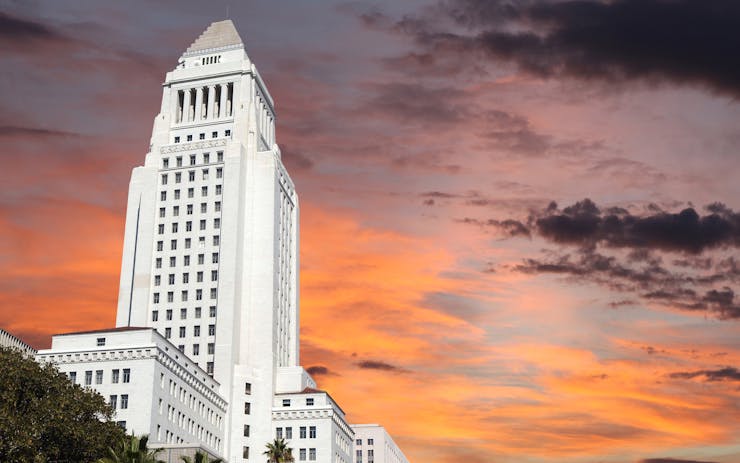After more than a year of official hearings and public input, the Los Angeles City Council on Wednesday cleared a major hurdle, voting to approve a package of three ordinances that will govern the city’s medical and adult-use cannabis industries when the state’s legal market launches next year.
“Today is the day, today is the vote, today is our moment to set the tone … for the rest of this country,” City Council President Herb Wesson prior to the vote, predicting the rules could become a template for other cities across the country. “That’s who we are. That’s how we roll.”
The council’s approval comes just weeks before California’s state-regulated cannabis market goes online, on Jan. 1. Given the timing of the vote, industry observers say it’s unlikely LA will see legal sales begin that day.
“We’re going to see state-licensed cannabis businesses in Los Angeles in the next couple months,” Ariel Clark, an attorney at Clark Neubert and founder of the LA Cannabis Task Force, told Leafly after the vote.
While there won’t be a formal cap on the number of licenses available in the city, zoning requirements and other restrictions may impose their own limitations.
Los Angeles has long been an unruly frontier in the cannabis industry, where hundreds of illegal dispensaries and cultivators proliferated. The legal marketplace is seen as a way to impose order, hopefully squeezing out illegal operators while raising a cascade of new taxes for City Hall.
The city’s final regulations, which have been in formal development since May 2016, will govern a wide range of business operations, including where cannabis businesses may be located, the local licensing process they’ll have to undergo, and daily matters such as security and surveillance systems.
Council members characterized the rules as a work in progress, almost certain to see revisions next year.
While there won’t be a formal cap on the number of licenses available in the city, zoning requirements and other restrictions may impose their own limitations. One of the more hotly contested aspects of city’s regulations, for example, was the size of the buffer zone required between cannabis businesses and “sensitive use” spaces, such as schools, public parks and drug abuse treatment facilities. San Francisco grappled with similar issues last month.
Under the final regulations, retail businesses must be at least 700 feet from other cannabis-selling operations and sensitive use spaces. That’s a slightly more stringent requirement than required by state law, but it’s looser than the 800-foot buffer zone initially considered by the city.
Non-retail and delivery businesses face different requirements. They simply must operate at least 600 feet from any school.
Wesson’s office said the rules would take effect immediately after the signature of Mayor Eric Garcetti, which is expected. The application process could begin as soon as Dec. 15.
Some cannabis businesses, such as Proposition D dispensaries—longtime medical shops that the city has permitted to operate despite a blanket ban on retail cannabis—will receive limited immunity under the plan, protecting them from prosecution during the transition period to state-regulated sales.
“We are going to makes sure those operators that have been good business operators since 2007 get to go ahead and move forward,” Cat Packer, executive director of the Los Angeles Department of Cannabis Regulation, said at Wednesday’s meeting.
Other businesses eligible for the grace period are non-retailers, such as cultivators or manufacturers, that can show they’ve been in operation since before Jan. 1, 2016. To qualify, they must have worked with Prop D-compliant dispensaries, be located in an appropriate zoning district, and fulfill numerous other requirements.
“There really needed to be some sort of pathway for existing operators,” said Clark of the LA Cannabis Task Force.
This limited immunity for qualifying shops and other operators will protect them until they secure temporary local and state licenses, which California regulators say they’ll begin distributing on Jan. 1. Prop D dispensaries will also be first in line to apply for LA’s licenses, getting a shot at securing permits before the flood gates open to others.
What happens after that is less clear. The city has adopted a so-called “social equity” program aimed at addressing the decades of disproportionate harm unleashed on minority communities by the war on drugs, and it appears those who qualify for the program will be next in line for local licenses after existing legal businesses.
Qualifying for the equity program is determined primarily by income, area of residence, and any previous marijuana-related convictions, although the final regulations are slightly different than initially suggested.
Top priority will go to two types of applicants: those who are low-income (defined as making 80% or less of the area’s median income) and have lived at least five years in a neighborhood identified as having high rates of both poverty and cannabis-related arrests; and those who are low-income and have a previous cannabis conviction.
“I’m ready to level the playing field,” Council Member Curren Price said at Wednesday’s vote, “so everyone has a far shot at reaping the reward of this booming industry.”
The Associated Press contributed to this report.





